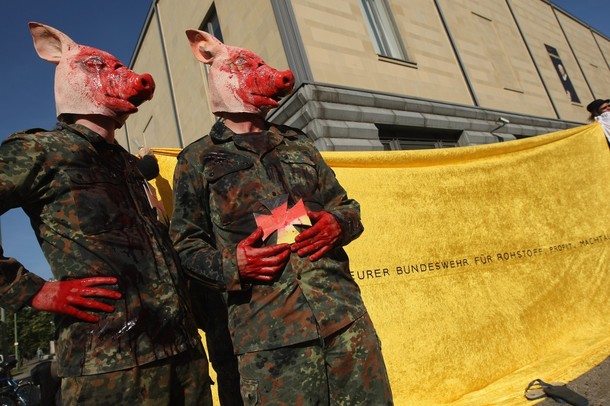
From William Boston, Time: 43 [German soldiers] have been killed since the Afghan mission began. That’s less than 1% of the 4,350 German soldiers deployed in Afghanistan, but nonetheless a large number for a country that has for two generations studiously avoided military conflict. The deaths have forced Germans in the heimatfront (home front) to confront the fact that their soldiers are fighting and dying on foreign soil, a deeply unsettling prospect for a nation with an especially bitter legacy of war. …
Whatever the differences of opinion Germans had about their country in the decades after Hitler’s defeat, there was solid consensus that German soldiers should never go to war again. It’s the one lesson that every generation of Germans since 1945 has been force-fed in schools, by public television and through the nation’s leaders: Germany’s army, the Bundeswehr, was created in November 1955 solely for the purpose of defending the country’s borders from foreign attack. But attitudes began to change in the 1990s, when German troops deployed to Kosovo as peacekeepers. Afghanistan, too, was initially seen as a humanitarian mission, to build roads and schools and help the locals.
Few Germans now cling to that illusion. For the first time since the end of World War II, soldiers are returning to Germany in flag-draped caskets. …
For many Germans, the question is not whether the war can be won, but how that war fits into their sense of national identity. As their lives fill with the images, language and rituals of battle, Germans are finding it difficult to reconcile their sense of duty with old feelings of guilt. …
[Defense Minister Karl-Theodor zu] Guttenberg has made moves to address the military’s equipment issues, ordering more than $1.3 billion worth of new Puma infantry fighting vehicles. But there’s little doubt that after declining to engage in battle for so long, Germany is having to relearn how to wage war. Some lessons are taking time to sink in, like the importance of supplying soldiers with the right equipment and weaponry. The past two parliamentary commissioners supervising the Bundeswehr have repeatedly lamented the lack of appropriate equipment for troops, especially armored vehicles, battlefield medical units and usable helicopters — none of the Bundeswehr’s 85 helicopters are outfitted for use in medical evacuation, so it has to borrow some from the Americans to fly out its wounded soldiers.
Germany lags behind most Western states in the handling of wounded and traumatized soldiers when they return from battle — something that was not an issue for an army that didn’t venture off its home turf. It was only late last year that the military opened its first center dedicated to the research and treatment of soldiers suffering from posttraumatic stress disorder (PTSD). "Until recently, the numbers of cases of PTSD … were insignificant," says Colonel Peter Zimmermann, director of the Trauma Center at the German Army Hospital in Berlin. "Now we are seeing more cases from Afghanistan and a wave of people who were in Kosovo and are only now exhibiting symptoms." The number of PTSD cases among German troops has surged over the past four years, from 85 in 2006 to 466 in 2009. …
On April 9, Chancellor Angela Merkel attended the memorial service for Hartert and his comrades: it was the first time she had publicly paid her respects to soldiers killed in combat. Such displays are rare in a country that does not even have a formal military cemetery; when he opened the Bundeswehr memorial in Berlin in September, then President Horst Köhler noted that "in the past, the death of soldiers [had] often been used for propaganda." The memorial is the latest step in a long effort to restore public trust in the military. It stands adjacent to Bendler Block, the former Wehrmacht quarters where Colonel Claus Schenk Graf von Stauffenberg and others who tried unsuccessfully to assassinate Hitler were executed on July 21, 1944. The stark juxtaposition is meant to show that Germany has moved on, with its armed forces now rooted in democratic traditions. To press the point, the German army swears in its new recruits on the anniversary of the Stauffenberg plot.
Modern Germany is wary of any hint of the idolatry of the army that was typical in the Nazi period, and so shrinks from attempts to honor soldiers who are wounded or killed in battle. …
R]ecently, Reinhold Robbe, a former Bundeswehr commissioner (a liaison between the army and parliament) launched a campaign to create a German Veterans’ Day — but got only a lukewarm response. "We don’t have to follow the Americans and create some kind of hero worship," said Rainer Arnold, a defense expert and MP for the opposition Social Democrats. "A Veterans’ Day does not reflect the way our culture deals with the Bundeswehr." (photo: Getty)
Image: getty%208%2015%2010%20protesters%20German%20memorial.jpg
